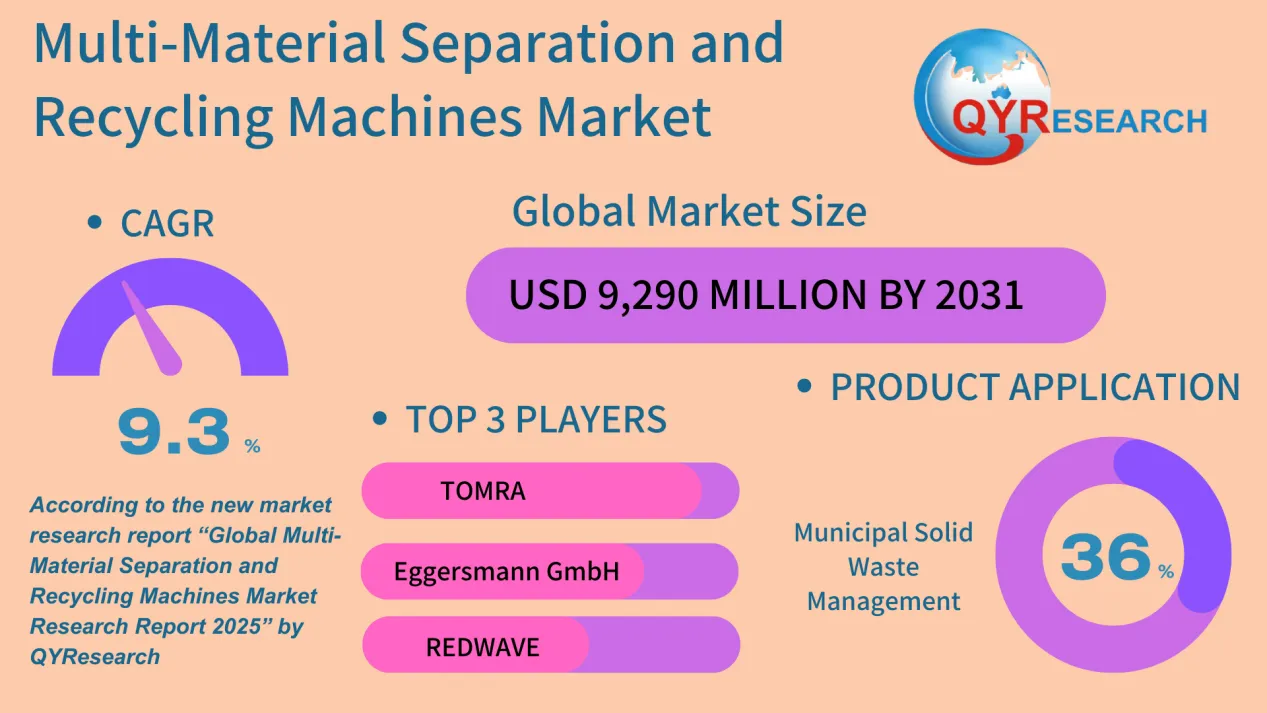The global market for Multi-Material Separation and Recycling Machines, valued at USD 4,985 million in 2024, is projected to reach USD 9,290 million by 2031, growing at a compound annual growth rate (CAGR) of 9.3% over the forecast period, according to the latest 2025 Global Market Research Report by QYResearch. This robust growth is driven by technological innovation, rising waste management demands, and a shift toward sustainable industrial practices.

Key Players and Technological Innovations
Leading companies in the global market include TOMRA, STADLER Anlagenbau GmbH, Eggersmann GmbH, Machinex Technologies Inc., REDWAVE (BT-Wolfgang Binder GmbH), CP Group, Bühler Group, STEINERT GmbH, Sesotec GmbH, and Waste Recycling Technologies Ltd. Notably, TOMRA’s recent launch of the GAINnext™ deep learning sorting system has been recognized as a technological breakthrough, enabling more accurate identification and separation of mixed material streams.
Other companies such as STEINERT GmbH and Sesotec GmbH have also accelerated the integration of artificial intelligence and sensor-based technologies to enhance material recovery from municipal solid waste and e-waste, with applications expanding into construction and demolition debris treatment and industrial waste processing.
Market Segmentation
By Type:
Optical Sorting Equipment
Magnetic and Eddy Current Separators
Air and Wind Sorting Systems
Crushing and Screening Systems
Others
By Application:
Municipal Solid Waste Management
E-Waste Recycling
Construction and Demolition Waste Treatment
Industrial Waste Processing
Others
Regional Insights
Asia-Pacific is expected to witness the fastest growth through 2031, driven by urbanization, policy support for sustainable infrastructure, and increasing investments in automated waste recycling facilities. North America and Europe maintain steady growth, with significant focus on regulatory compliance and circular economy strategies.
Industry Trends in 2025
AI Integration: Transforming the Efficiency of Material Sorting
In 2025, artificial intelligence continues to reshape the recycling industry, with optical sorters powered by machine learning becoming industry standard. These systems, pioneered by companies like TOMRA and Recycleye, are capable of distinguishing between complex material streams such as mixed plastics, metals, and composite waste with unprecedented accuracy. TOMRA’s GAINnext™, for example, uses deep learning to identify challenging materials like black plastics and multilayer packaging, increasing sorting purity rates by over 30% in some trials. According to Recycling Product News, AI-based systems have reduced contamination rates in municipal recycling facilities by up to 50%, significantly increasing overall recovery yields and reducing landfill dependency.
Modular Recycling Plants: Flexibility for Remote and Decentralized Operations
The rise of low-cost, portable, modular recycling units is another major trend. Initiatives like the European-funded RECLAIM project are deploying AI-enabled robotic systems in geographically isolated areas such as the Greek islands. These modular plants are designed for plug-and-play installation, drastically reducing infrastructure and transportation costs while expanding local recycling capacity. Startups such as EverestLabs and AMP Robotics are also promoting compact systems suitable for use in smaller municipalities or industrial campuses, promoting circularity at the local level.
Circular Economy Focus: From Waste to High-Value Resources
Circular economy principles are driving new investments into enzymatic and chemical recycling technologies capable of breaking down hard-to-recycle materials such as nylon 6, multilayer plastics, and flexible films. Australian biotech firm Samsara Eco made headlines in late 2024 for developing a proprietary enzyme that can depolymerize nylon back into its raw monomer, enabling repeated reuse without quality loss. Similarly, Trinseo’s partnership with ReSolved Technologies has advanced polystyrene recycling through closed-loop mechanical systems. These breakthroughs support growing corporate and regulatory mandates for recyclability and extended producer responsibility.
Tariff Impacts and Supply Chain Realignment
The 2025 U.S. tariff reforms have prompted significant shifts in supply chain strategies across the recycling machinery sector. With tariffs increasing on certain categories of imported automation equipment, manufacturers are re-evaluating their sourcing and assembly locations. Companies like CP Group and Bühler Group are expanding their production capabilities in North America and Europe respectively to mitigate risks. These changes are also leading to the localization of component manufacturing, shortening lead times and improving supply chain resilience.
With the global market projected to reach USD 9.29 billion by 2031, the industry’s rapid transformation reflects an increasing alignment between technological innovation, sustainability goals, and economic policy. As AI becomes more affordable and modular systems spread access to recycling technology, stakeholders across the value chain are positioned to benefit from increased material recovery, reduced emissions, and a stronger circular economy.
Related Reports:
Global Multi-Material Separation and Recycling Machines Market Research Report 2025
https://www.qyresearch.com/reports/4739784/multi-material-separation-and-recycling-machines
Multi-Material Separation and Recycling Machines – Global Market Share and Ranking, Overall Sales and Demand Forecast 2025-2031
https://www.qyresearch.com/reports/4739783/multi-material-separation-and-recycling-machines
Global Multi-Material Separation and Recycling Machines Sales Market Report, Competitive Analysis and Regional Opportunities 2025-2031
https://www.qyresearch.com/reports/4739782/multi-material-separation-and-recycling-machines
Global Multi-Material Separation and Recycling Machines Market Insights, Forecast to 2031
https://www.qyresearch.com/reports/4739781/multi-material-separation-and-recycling-machines
About Us
QYResearch founded in California, USA in 2007. It is a leading global market research and consulting company. With over 18 years’ experience and professional research team in various cities over the world QY Research focuses on management consulting, database and seminar services, IPO consulting, industry chain research and customized research to help our clients in providing non-linear revenue model and make them successful. We are globally recognized for our expansive portfolio of services, good corporate citizenship, and our strong commitment to sustainability. Up to now, we have cooperated with more than 66,000 clients across five continents. Let’s work closely with you and build a bold and better future.
Contact Us:
If you have any queries regarding this report or if you would like further information, please contact us:
QY Research Inc.
Add: 17890 Castleton Street Suite 369 City of Industry CA 91748 United States
E-mail: global@qyresearch.com
Tel: 001-626-842-1666(US) 0086-133 1872 9947(CN)
EN: https://www.qyresearch.com
JP: https://www.qyresearch.co.jp
